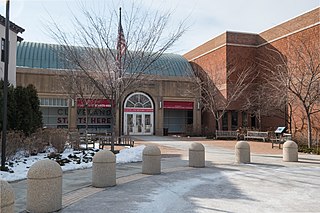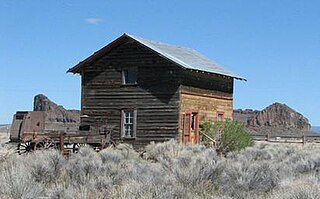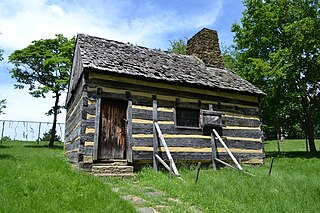
The Western Reserve Historical Society (WRHS) is a historical society in Cleveland, Ohio. The society operates the Cleveland History Center, a collection of museums in University Circle.

Abraham Lincoln Birthplace National Historical Park is a designated U.S. historic park preserving two separate farm sites in LaRue County, Kentucky, where Abraham Lincoln was born and lived early in his childhood. He was born at the Sinking Spring site south of Hodgenville and remained there until the family moved to the Knob Creek Farm northeast of Hodgenville when he was two years old, living there until he was seven years of age. The park's visitor center is located at the Sinking Spring site.

Mineral King is a subalpine glacial valley located in the southern part of Sequoia National Park, in the U.S. state of California. The valley lies at the headwaters of the East Fork of the Kaweah River, which rises at the eastern part of the valley and flows northwest. Accessed by a long and narrow winding road, the valley is mostly popular with backpackers and hikers.

The James Whallon House is a historic former farmhouse in the village of Greenhills near Cincinnati, Ohio, United States. It was at least the third Ohio home of James Whallon and his family, who settled in the region in 1800, purchased the land around the present house in 1806, and built a log cabin on the property before constructing the present house in 1816.

Austintown Log House is a log cabin near Youngstown, Ohio, listed on the National Register of Historic Places on July 30, 1974. It is managed by the Austintown Historical Society and commonly known as the "Austin Log Cabin".

The Main Street Historic District in Fort Atkinson, Wisconsin, United States, was placed on the National Register of Historic Places in 1984. The district is composed of 51 buildings on or within a block of Main Street.

Isham Park is a 20-acre (81,000 m2) historic park located in Inwood, Manhattan, New York City. The park was created in large part through gifts to the city from the Isham family of land from the William Bradley Isham estate. It sits roughly between Broadway, Isham Street, Seaman Avenue, and West 214th and 215th Streets.

The dogtrot, also known as a breezeway house, dog-run, or possum-trot, is a style of house that was common throughout the Southeastern United States during the 19th and early 20th centuries. Some theories place its origins in the southern Appalachian Mountains. Some scholars believe the style developed in the post-Revolution frontiers of Kentucky and Tennessee. Others note its presence in the South Carolina Lowcountry from an early period. The main style point was a large breezeway through the center of the house to cool occupants in the hot southern climate.

The Fort Rock Valley Historical Homestead Museum is located in Fort Rock, Oregon, United States. Opened in 1988, it is a collection of original homestead-era buildings including a church, school, houses, homestead cabins, and several other buildings assembled in a village setting. The structures were moved to the museum site from various locations around the Fort Rock Valley, named for volcanic landmark Fort Rock. Most of the buildings contain historic items used by local homesteaders including furniture, dishes, household products, and tools. The museum is open for self-guided tours from mid-March through September.

The Headquarters of George Washington is a historic site located at 38 Greene Street in Cumberland, Maryland in central Allegany County. The centerpiece and primary attraction at the site is a historic log cabin twice occupied by George Washington, the first President of the United States of America. The cabin resides in an area known today as Riverside Park, but was originally built about 2 blocks away, the original site is located nearby at 16 Washington Street.

Holy Family Catholic Church is a historic Roman Catholic church in Wayne Township, Darke County, Ohio, United States. Located in the unincorporated community of Frenchtown, it houses an active congregation, and it has been accorded historic site status because of its well-preserved Gothic Revival architecture.

The Neal Log House is a historic log cabin built in 1765 in Pittsburgh, Pennsylvania. The Neal Log House is the oldest existing residential structure in Pittsburgh and one of the last few buildings left from the eighteenth century. The two other buildings - the Old Stone Inn, 1756 and The Fort Pitt Block House, 1764 are not residential structures. The Pittsburgh History and Landmarks Foundation placed a Historic Landmark Plaque on the building in 1970. In 1977, it was named a City of Pittsburgh Designated Historic Structure. It is part of Schenley Park U.S. Historic District The house was originally called the "Neal Log House" which is the predominant spelling of the family’s name. However in various documents the last name was spelled Neil and on one document Neill. In 1969 Charles Covert Arensberg wrote a paper entitled "The spelling of Robert Neill who built the Neill Log House in Schenley Park". It is now known that Arensberg made several erroneous assumptions about the spelling of the last name. Unfortunately the 1969 paper was used to submit to the city to change the name from "Neal" to "Neill" in spite of the fact the most common spelling of the family’s name was "Neal". [6].

The McClurg Museum is a renovated mansion in Westfield, New York that serves as the home of the Chautauqua County Historical Society. It is a volunteer-run museum containing various artifacts collected by the historical society along with an extensive library and photo collection. It is open to the public and local schools for educational purposes.

The Greenfield School in West Allis, Wisconsin was built as a two-room school in 1887, but in an elegant Romanesque Revival style unusual for such buildings. It was added to the National Register of Historic Places in 2006.

The Mercer Log House is a large log cabin in the city of Fairborn, Ohio, United States. Home to the city's first settlers and changed very little since their time, it is one of Ohio's best preserved log cabins from the settlement period, and it has been named a historic site.

The South Main Street Historic District is a surviving collection of eleven commercial buildings built from 1877 to 1915 in the old downtown of Oregon, Wisconsin, plus the WWI memorial. It was added to the State and the National Register of Historic Places in 2000.
Bacon Log Cabin was a cabin built as early as the 1820s in Ballwin, St. Louis, Missouri. Bacon Log Cabin is currently used as a museum of St. Louis history. It was formerly a cabin built and owned by William Bacon, who passed it on through the family, starting with his grandson, William Douglas Bacon.

The Old World Third Street Historic District is the last relatively intact part of the original German retail district in Milwaukee, Wisconsin's Kilbourntown plat, containing examples of various styles of Victorian commercial architecture going back to 1855. It was listed on the National Register of Historic Places in 1987 and on the State Register of Historic Places in 1989.

The Columbia Historic District is a neighborhood in Cedarburg, Wisconsin, that is listed on the National Register of Historic Places. At the time the district was listed on the register, its contributing properties included 128 historic homes, one church, and eighty-seven historic outbuildings, including garages and barns, all constructed between 1844 and 1938. The district also contained several dozen building that were not considered to contribute to the historic district, including modern homes from the post-war era as well as modern garages and other additions to historic properties.


















